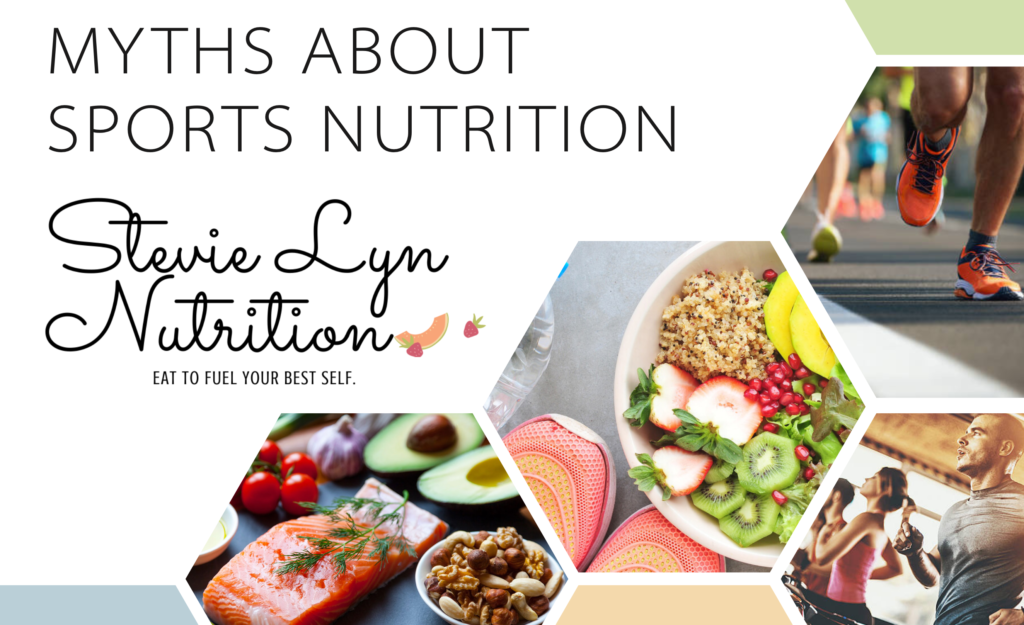Sports Nutrition Myths – Should You Eat Less During Taper?

Sports Nutrition Myths: Should You Eat Less During Taper?
The short answer is no, athlete’s should not be focused on eating less or restricting calories before their race but instead aim to maintain their recommended calorie needs throughout the training cycle. This oftentimes feels counterintuitive for many, as you will be training less during the taper phase if done correctly. Here’s why we’re busting this myth:
The Importance Of Nutrition In Taper
As you head into your race, the taper phase can begin 2-3 weeks before your goal race. The length will vary depending on the individual athlete and the distance of the race. At this point in the training cycle all of the work to build fitness is done. This time is designed for the athlete to give the body more rest and adequate nutrients to repair and recover to be ready on race day. To learn more about taper and how to manage your taper from a USAT coach, be sure to check out this blog.
How To Approach Nutrition In Taper
During the first week or two of taper (again,depending on how long the taper phase is) is a great time to include more anti-inflammatory and antioxidant-rich foods, along with adequate protein and carbohydrates. These nutrients will help to support the muscle repair and recovery process. Including more of these nutrients doesn’t mean that others should be neglected. If an athlete is counting calories or limiting food intake at any point in their training, they are more likely to fall short on important nutrients.
Unsure of what specific foods you should be looking to add in to support your recovery? Here are some foods rich in the previously mentioned nutrients to consider adding during your first week or so of taper before heading into a carb load:
- Berries
- Salmon
- Avocados
- Nuts and seeds
- Flax seeds, chia seeds, and walnuts in particular!
- Whole grains and other complex carbohydrates
- Quinoa, potatoes, and sweet potatoes are just a few examples
- Lean protein sources such as chicken, fish, beans, and tofu
In addition to eating enough overall and incorporating nutrient dense foods to support recovery, it is also critical to make sure you’re meeting your hydration needs during taper. Getting to the start line hydrated, and then executing your fueling and hydration strategies during the race can prevent the negative performance outcomes related to dehydration.
When To Carb Load
After all of the hard work done during your training cycle, the athlete should want to show up to the start line ready to perform at their best—this is where carb loading comes in if you’re going to be racing for 2 hours (or longer!)
Carb loading should show up on your nutrition plan until two days out from your race if you’re racing longer than two hours at your race effort. During the carb load, the athlete should begin to shift their intake to increase carbohydrates from easily digested sources while also reducing fat and protein intake. The goal of this is to restock the body’s carbohydrate stores, known as glycogen, for the body to use for fuel on race day.
After spending the first week or two of taper focused on meeting caloric needs with nutrient dense foods and staying well-hydrated, increasing carbohydrates to 65-75% of caloric intake for the 48 hours before a race is the last step to nutritionally prepare for your race. It’s important for athletes to remember that with every one gram of carbohydrate stored as glycogen, three grams of water will also be stored. It is normal to see a water related weight gain of 3-5 lbs during carb loading. The focus of taper should be preparing your body to perform and the scale should be avoided at this time.
Key Takeaways
- Athletes should aim to maintain their recommended caloric needs during peak training throughout taper.
- Focus on nutrient dense foods during the first 1-2 weeks of taper to promote muscle repair and recovery.
- Stay hydrated! This means getting adequate electrolytes, too.
- Add in carbohydrate loading the two days before races lasting longer than two hours, especially if racing at a PR pace or your best effort.
- Taper is NOT the time to focus on the scale, your weight, or any type of restriction.
References:
- Vitale K, Getzin A. Nutrition and Supplement Update for the Endurance Athlete: Review and Recommendations. Nutrients. 2019 Jun 7;11(6):1289. doi: 10.3390/nu11061289. PMID: 31181616; PMCID: PMC6628334.
- Jeukendrup AE. Nutrition for endurance sports: marathon, triathlon, and road cycling. J Sports Sci. 2011;29 Suppl 1:S91-9. doi: 10.1080/02640414.2011.610348. Epub 2011 Sep 15. PMID: 21916794.










